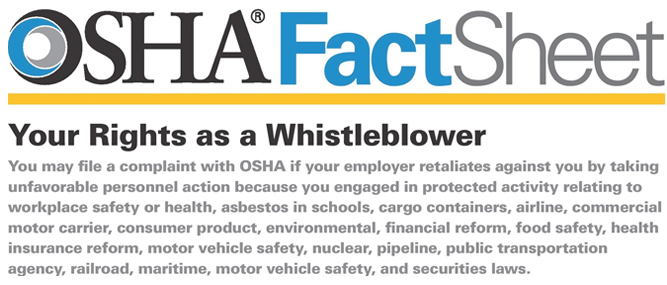There are 22 federal statutes in the United States enforced by OSHA that protect whistleblowers. Whistle-blowers in a job setting are workers who report their employers for something they have allegedly done wrong or for something they aren’t doing that they should be doing.
In a recent case involving a pallet company, federal officials ordered IFCO Systems (now CHEP Recycled Pallet Solutions) to pay $105,000 to an employee who was fired from its Biglerville, Pennsylvania, plant. According to OSHA, the female employee was fired in July of 2014 after repeatedly expressing her concern to plant management about being exposed to mold growing behind a file cabinet in an office at the plant, and requesting to be relocated to a different work area.
“The employee filed a complaint with OSHA alleging her termination by IFCO was retaliation for reporting the mold hazard,” an OSHA press release said. She was fired less than three weeks after her last complaint about her health concerns.
Following the OSHA complaint, IFCO did hire an environmental health contractor, who after sampling the mold, confirmed that there was a mold hazard that needed immediate remediation, according to OSHA.
Thousands of whistleblower complaints are made to OSHA each year, and these have actually been on the rise in recent years. According to OSHA, there were 3,288 whistleblower complaints filed in FY 2015, a 6% increase from 3,098 complaints filed the previous fiscal year.
If you want to know what OSHA looks for in a whistleblower investigation, check out this field manual recently updated by OSHA. You can access it at https://www.osha.gov/OshDoc/Directive_pdf/CPL_02-03-007.pdf
With all this whistleblowing going on, you may be wondering what you can do to prevent having this type of complaint filed against your company.
One of the simplest and most effective things you can do is to first give employees a means to express themselves without fear of retaliation and with the knowledge that they will be taken seriously. Then thoroughly investigate their complaint to determine whether or not it’s legitimate, and if it is, take the action that is necessary to resolve the situation.
In many whistleblower cases, like the one mentioned in this article, the employee did first go to the employer to try to express her concern about the mold situation, and did so on more than one occasion.
If you create a culture at your business that lets employees know their opinions are valued, and that you welcome their input and concerns, let’s face it, there will be a lot people working to help your business succeed.
No matter how open of the culture you create, there will always be some employees who won’t speak out. That’s why it’s also important to give employees a means for passing along information anonymously. For example, you can do this by completing regular surveys of employees at staff meetings, and ask that they not put their names on the forms. You can also set up and encourage their use of a suggestion box.
It is important to regularly stress to employees that management will take complaints and safety concerns seriously. One way to make this clear is to have set processes in place to deal with complaints and safety concerns. Make sure all employees understand how to report a concern, including any ways to do so anonymously. Also educate all employees on the processes that you have in place for investigating, analyzing, and finally fixing any issues that the investigation and analysis show need to be fixed.




